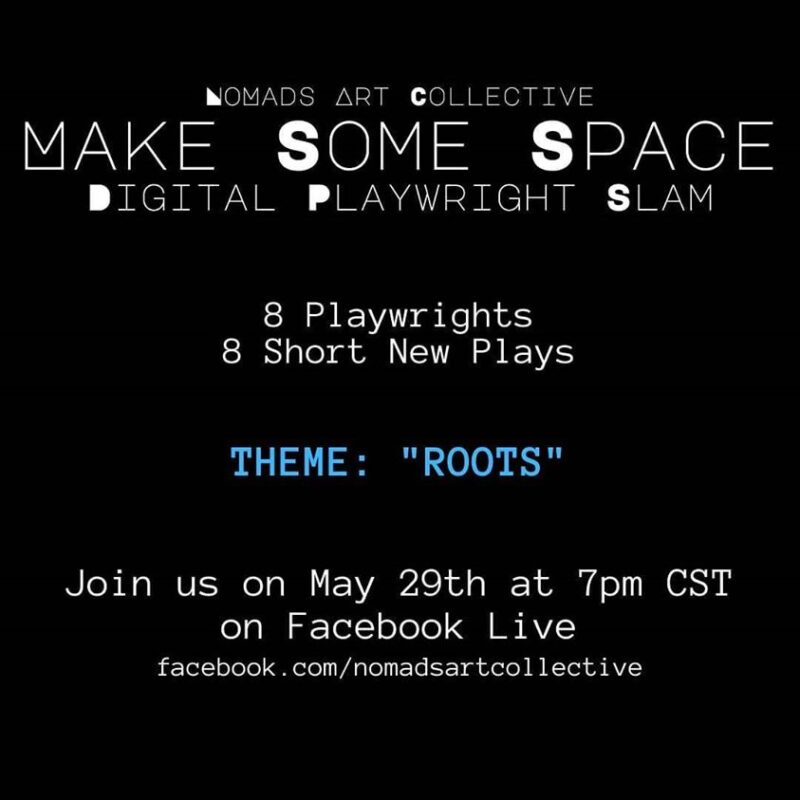Gin To shares a piece of theatre throbbing with silence. A daughter returns home to visit her dying mother, reflecting on the physical home she returns to, and her first home – her mother’s womb. Together, they uncomfortably navigate a relationship pockmarked by the things left unsaid, using words, gaping voids and the blood that binds them to find some semblance of connection, both corporeal and incorporeal.
Inspired by Ocean’s Vuong’s letter to his mother in the New York Times, this is for mẹ lives online as a borderless mailbox for Asian identified people to share stories rooted in mothers, motherhood, motherlands, mother-tongues and family.
Blood Utterances
The above video is an excerpt of the play being performed at a slam in May 2020. The slam asked a group of six actors to read eight pieces. Playwrights therefore had to write “open characters.” The two actors that ended up reading the piece were white and Latinx.
BLOOD UTTERANCES by Gin To
SUMMARY
JEANINE returns to her childhood home to be with her dying mother, MISTY.
CHARACTERS
MISTY – 60s/70s, mother, dying
JEANINE – 20s/30s, child, holding back is her attempt at kindness
NOTES FOR ACTORS
Stage directions highlighted are read. “/” indicates interruptions.
*trigger warning: graphic language of stillbirth and placentophagy
1
MISTY and JEANINE sit on the porch. The sky is the color of a womb, reddish and fleshy. A placenta between them.
MISTY
Welcome home, Jeanine.
JEANINE
Sure.
MISTY
I’ve missed you.
JEANINE
Sure.
MISTY
A lot.
JEANINE
Uh huh.
MISTY
It feels good to have you back.
…
In my womb.
JEANINE
It’s very, stuffy.
MISTY
Oh, sure. I mean, it isn’t very spacious, my womb. Always been a little too small. Suffocating, even. You know Jacob, the brother you would have had? He suffocated. Only 7 months along. A shame, really. I guess wombs are / a fickle place—
JEANINE
That’s an understatement.
MISTY
Oh, sure.
JEANINE
You were depressed for months. That one skinny friend of yours had to come over every day to tell you funny jokes.
2
MISTY
Oh Marina! Marina! She passed last year. We’re all withering away. Dropping dead one by one. Did I tell you about Marina coming over every day? How do you know this? Or was it dad?
JEANINE
You did. You have told the story of your dead child a million times at least. From start to finish. At dinner parties, New Year’s Eve, grandma’s funeral. On that one trip we took to Europe. Literally. All the time.
MISTY
Sure, sure. But all in casual fun, really. I never tell that story to upset anyone or to be upset myself. It’s just a very good story! Shows my resilience well. Still birth. Depression. Eating the placenta helped a little. Then I sprung right back. Back on my game. Whoosh. 3 months later, I was pregnant with you.
JEANINE
…
Did you just say, uh, I’m sorry, I think you said you ate the placenta?
MISTY
Yeah.
JEANINE
…
Why?
MISTY
A lot of new mothers do. Raises your energy. Better breast milk quality. Although, I guess I didn’t need good breast milk quality with a dead baby. But it did help with the depression, it did. So anyway, I got back on my game very quickly. Your dad was determined to have a kid. We went on a nice little vacation. And came you. A blessing.
JEANINE
I don’t like that.
MISTY
What don’t you like?
JEANINE
I don’t like being a blessing. That’s a lot of pressure.
The conversation shifts. They are choosing their next words.
MISTY
Is that why you never came back?
3
…
You only came back because I was dying.
JEANINE
Mom—
MISTY
Let’s talk about something else.
JEANINE
…
Okay.
…
…
(With new-found purpose)
Why are you doing this?
MISTY
I ran into Tim the other day, that boy you used to date—
JEANINE
Why are you doing this?—
MISTY
Tim got married a few weeks ago. His wife is Japanese! Do / you still—
JEANINE
You were clearly fishing for attention. You want me to reassure you that “noooo, mom, I came back because I love you! Nooo, mom, I would have come back anyway,” you need to stop. You and your, guilt trip. The passive aggressive, fishing, you need to stop that.
…
…
MISTY
I should just die tomorrow.
JEANINE
You should.
…
…
4
You know, I fantasize about you dying. All the time. Ever since I was 14. Every time I’m mad at you, I imagine you dying. Sometimes, it’s a chronic illness of some sort. Sometimes, it’s more violent. A plane crash, maybe. Or, I don’t know, maybe I just find out on the phone. A relative calls to tell me you went to sleep and never woke up. Every time I fantasize, I get, really really hurt. But then I feel better. I feel better every time I mourn your imaginary death.
MISTY
I read somewhere that the placenta is a kind of language between a mother and a child, our first one, our true mother tongue. / Isn’t that sort of poetic?
JEANINE
Maybe I should eat it. Swallow it whole. Become a monster.
JEANINE looks at the placenta between them. Pumping. Bloody. Like speaking the same language.
MISTY
I just want you to love me.
JEANINE
I won’t say it.
MISTY
I just want you to love me. What a shame. What a shame. Almost thirty years. Wasted. I grew you inside of me. Then outside. Then far away. But the whole time, you were plotting and planning. Trying to get away. What a waste.
JEANINE
You don’t, grow a human just to receive love. You can’t, create a life, create a living being, because you need love. That is not fair.
MISTY
I don’t know what you want from me.
JEANINE
I, want to punish you. I feel awful. I want to be a good person. But I keep fantasizing about you dying. It’s hard to feel like a good person with such thoughts.
They look on. JEANINE wonders what would happen to a child inside a dead mother’s belly. End of play.

Artist Bio
 Gin To is a theatre artist and writer based in Chicago. Born in 1997 in Ho Chi Minh City, she was raised largely uncritical of the violent currents of Vietnamese history and of the transformational forces of global capitalism. Her writing explores how class, globalization, postcoloniality, queerness, and intergenerational trauma is rooted in the body. These past few months, she has been deeply missing live theatre, being in the same room with humans, and having expansive, unresolved conversations. On the bright side, she has been getting into writing more seriously and has made unexpected connections with creatives of the Vietnamese diaspora. Instagram: @gintonic2912
Gin To is a theatre artist and writer based in Chicago. Born in 1997 in Ho Chi Minh City, she was raised largely uncritical of the violent currents of Vietnamese history and of the transformational forces of global capitalism. Her writing explores how class, globalization, postcoloniality, queerness, and intergenerational trauma is rooted in the body. These past few months, she has been deeply missing live theatre, being in the same room with humans, and having expansive, unresolved conversations. On the bright side, she has been getting into writing more seriously and has made unexpected connections with creatives of the Vietnamese diaspora. Instagram: @gintonic2912


